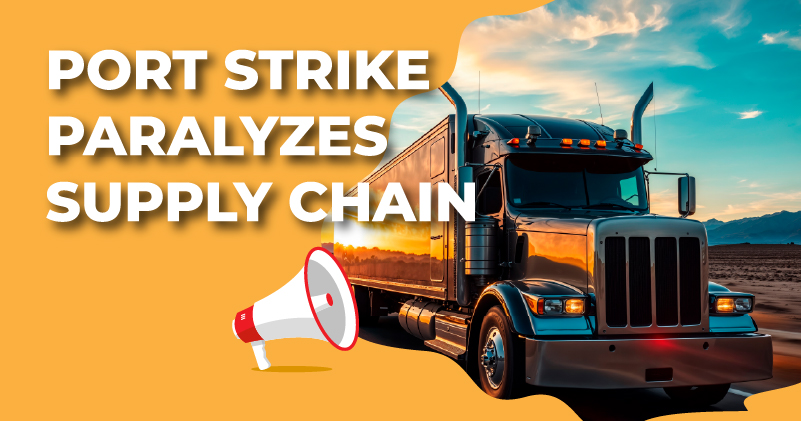
The American supply chain is facing a major crisis as a result of a massive port strike initiated by dockworkers represented by the International Longshoremen’s Association (ILA). Approximately 45,000 dockworkers walked off the job earlier this week, shutting down all major shipping ports along the Eastern and Gulf Coasts, spanning from Maine to Texas. This strike has brought the nation’s supply chain to a grinding halt, with severe consequences expected for consumers, businesses, and industries that rely heavily on the smooth flow of goods through these critical ports.
Understanding the Core Issues Behind the Strike
The primary demand fueling this labor action is a significant 77% wage increase, along with the implementation of strict limits on automation at the ports. The ILA has stated that these demands are essential preconditions for resuming negotiations with port authorities. The union is pushing back against the increasing trend of automating port operations, arguing that automation threatens job security and undermines workers’ bargaining power.
While the strike centers around wage hikes and automation limits, the ripple effects are already being felt far beyond the ports. With all major shipping activities halted, the disruption is creating a domino effect, impacting a wide range of industries, from agriculture to retail, and extending its reach to the daily lives of average consumers.
The Impact on U.S. Port Efficiency
American ports have long been criticized for inefficiency, a problem that this strike is only exacerbating. The latest Container Port Performance Index did not list a single U.S. port in the top 50 for efficiency worldwide. This is a stark reminder of the ongoing challenges faced by the American port infrastructure, which, when coupled with a labor stoppage, further escalates costs for consumers and delays for logistics providers.
Motor carriers and trucking companies that operate in and out of these ports are particularly vulnerable. They are left idling, with no access to the vital shipments they are meant to deliver. As a result, the inefficiencies at U.S. ports are not only hampering domestic trade but are also driving up costs, ultimately impacting the broader economy.
The Timing Could Not Be Worse: Holiday Season and Natural Disasters
The timing of the strike could not be more critical. The holiday season is approaching, a time when retailers typically ramp up inventory to prepare for the year’s peak shopping period. With the strike halting operations at several of the nation’s busiest ports, businesses may struggle to stock their shelves, leading to potential shortages and higher prices for consumers. This is particularly concerning for industries that rely on a steady inflow of goods, such as electronics, apparel, and toys.
Compounding the problem, the southeastern United States is currently recovering from the devastating effects of Hurricane Helene. With widespread flooding and damage in the storm’s aftermath, relief efforts are in full swing. However, the port closures are hindering the ability to move essential supplies and equipment to affected areas, complicating an already difficult recovery process.
 Critical Supply Chains at Risk
Critical Supply Chains at Risk
The longer the strike continues, the more severe its impact on various supply chains will become. Food and perishables will be the first to feel the strain, as these items have a limited shelf life and cannot endure prolonged delays. Consider these staggering figures:
- 75% of all bananas consumed in the U.S. are shipped through the affected ports.
- 85% of imported canned foods and
- 80% of imported beer, wine, whiskey, and scotch also arrive in containers through these East and Gulf Coast ports.
Additionally, over 100 other food categories rely on the smooth operation of these ports to reach American consumers. With the strike disrupting these shipments, consumers may soon face empty grocery shelves and higher prices on a wide array of staple goods.
Economic Consequences of Prolonged Shutdowns
The economic ramifications of the strike are already becoming apparent. In just a few days, the halt in port operations has created a backlog of nearly 62 ships carrying almost half a million containers that were scheduled for delivery in October. This vital cargo, now stuck in limbo, cannot be easily redirected to neighboring ports. Unlike past disruptions—such as the collapse of the Baltimore Key Bridge earlier this year—rerouting is not a viable solution, given the sheer scale and volume of goods involved.
If the strike drags on, the economic consequences will reverberate for months, with potential long-term damage to industries that depend on the timely movement of goods. America’s farmers, for instance, stand to lose $1.4 billion in weekly agricultural trade as a result of halted export markets. The strike is occurring just as the fall harvest season is in full swing, putting farmers’ livelihoods and the nation’s food supply chain at serious risk.
Trucking Industry Bears the Brunt
The trucking industry is one of the hardest hit by the ongoing strike. The port of New York and New Jersey alone employs 30,000 truckers, and on a typical day, around 12,000 truck visits occur. With the strike in effect, these drivers are left without work, their livelihoods hanging in the balance. This scenario is repeated up and down the Eastern and Gulf Coasts, where tens of thousands of truckers are now sidelined, awaiting a resolution.
This disruption is particularly damaging for small trucking businesses, which make up the backbone of the industry. More than 95% of carriers in the U.S. operate 10 trucks or fewer, with many being owner-operators. These small business owners often rely exclusively on port contracts, and the sudden loss of work is threatening not only their businesses but also their ability to support their families.
Broader Economic and Consumer Impacts
The effects of the strike extend far beyond the ports themselves. As goods remain stranded on ships, businesses across the country are beginning to feel the pressure. Manufacturers are scrambling to find alternative sources for materials, retailers are rethinking their inventory strategies, and consumers are likely to see higher prices for a range of products, from electronics to clothing.
The longer the strike drags on, the more severe the consequences will become. A disruption of this magnitude threatens to send shockwaves through the entire economy, undermining consumer confidence and potentially slowing down economic growth. With inflationary pressures already weighing on households, any additional price increases due to the strike will be particularly painful.
Conclusion
The ongoing port strike, driven by dockworkers’ demands for higher wages and limits on automation, has thrown the U.S. supply chain into disarray. The shutdown of major ports along the Eastern and Gulf Coasts has halted the flow of essential goods, from food to pharmaceuticals, and the repercussions are being felt across the trucking industry, agriculture, and retail sectors. As peak shipping season coincides with critical hurricane recovery efforts, the timing of this labor action could not be more disruptive.
Unless a resolution is reached soon, the strike will continue to jeopardize not only the livelihoods of those directly involved but also the broader U.S. economy, potentially causing long-term damage to supply chains and consumer confidence. The situation serves as a stark reminder of the fragility of America’s supply chain infrastructure and the urgent need for reform and investment to prevent future disruptions on this scale.
During times like these, trucking companies need robust solutions to navigate the challenges of a volatile supply chain. TMS-Digital is a leading TMS (Transportation Management System) software provider in the U.S., offering a comprehensive suite of tools designed to streamline operations, optimize routes, and enhance overall efficiency for trucking businesses. Our platform provides real-time tracking, automated load management, and smart route optimization, ensuring that even when external disruptions occur, your business can maintain its operations with minimal downtime.
For small trucking companies and independent owner-operators, TMS-Digital is an invaluable partner. Our user-friendly system is built to support the unique needs of small fleets, helping you save time, reduce operational costs, and maximize profitability. With features like electronic document management, automated dispatching, and detailed analytics, TMS-Digital empowers trucking businesses to stay ahead of the curve.
Don’t let disruptions derail your operations. Contact TMS-Digital today to learn how our TMS software can keep your business moving forward! Schedule a Free Demo.









